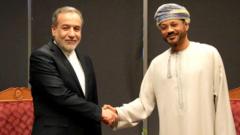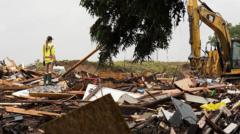The US and Iran have engaged in nuclear talks in Oman, marking the first significant dialogue since the US withdrew from the 2015 agreement. The discussions are focused on establishing a framework for future negotiations, with both sides expressing differing hopes for the outcome amidst a backdrop of strained relations.
US-Iran Nuclear Negotiations Commence Amidst Rising Tensions in Oman

US-Iran Nuclear Negotiations Commence Amidst Rising Tensions in Oman
Senior officials from the US and Iran have begun discussions in Muscat to explore a new nuclear agreement following the prior accord's breakdown in 2018.
In Muscat, Oman, high-level negotiations between the United States and Iran regarding Iran's nuclear program have commenced. The talks opened with Iranian Foreign Minister Abbas Araghchi expressing a desire for a "fair agreement" during his remarks to state television. This dialogue marks a significant turning point, as it is the first formal discussion following the US withdrawal from the 2015 nuclear agreement in 2018, a move that President Donald Trump initiated with the intent to negotiate a "better" deal.
Previously, Iran had dismissed the idea of renegotiating the agreement. Nonetheless, these talks are seen as a critical initial step to determine if a new deal can be established. Discussions are expected to outline a framework for future negotiations, though the specifics of whether the American and Iranian delegations will have direct talks remain uncertain. Araghchi has indicated that indirect communication at this phase could be more effective, despite US envoy Steve Witkoff's preference for in-person meetings.
The core issues revolve around the expectations from both nations regarding the deal: the US seeks assurances that Iran will not develop nuclear weapons, while Iran aims to limit, not eliminate, its nuclear activities in exchange for sanctions relief. Araghchi emphasized the team's expertise in nuclear negotiations, aiming for a mutually acceptable understanding to pave the way for future discussions.
In a related development, President Trump alerted Iran's supreme leader about the ongoing negotiations through a letter delivered via the United Arab Emirates. He has stated that the success of these talks is critical, threatening military action if an agreement cannot be reached. Concurrently, Iran maintains that its nuclear endeavors are exclusively peaceful and remains resistant to negotiations perceived under duress.
As the negotiations progress, the potential for a new deal depends on both sides' willingness to engage constructively and address the fundamental distinctions in their respective position on Iran's nuclear capabilities.
Previously, Iran had dismissed the idea of renegotiating the agreement. Nonetheless, these talks are seen as a critical initial step to determine if a new deal can be established. Discussions are expected to outline a framework for future negotiations, though the specifics of whether the American and Iranian delegations will have direct talks remain uncertain. Araghchi has indicated that indirect communication at this phase could be more effective, despite US envoy Steve Witkoff's preference for in-person meetings.
The core issues revolve around the expectations from both nations regarding the deal: the US seeks assurances that Iran will not develop nuclear weapons, while Iran aims to limit, not eliminate, its nuclear activities in exchange for sanctions relief. Araghchi emphasized the team's expertise in nuclear negotiations, aiming for a mutually acceptable understanding to pave the way for future discussions.
In a related development, President Trump alerted Iran's supreme leader about the ongoing negotiations through a letter delivered via the United Arab Emirates. He has stated that the success of these talks is critical, threatening military action if an agreement cannot be reached. Concurrently, Iran maintains that its nuclear endeavors are exclusively peaceful and remains resistant to negotiations perceived under duress.
As the negotiations progress, the potential for a new deal depends on both sides' willingness to engage constructively and address the fundamental distinctions in their respective position on Iran's nuclear capabilities.



















